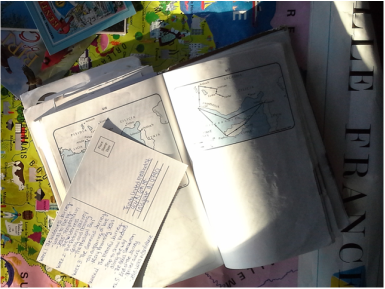A young boy spends the night alone in the forest to prove his courage so he could become king. While spending the night alone, he's visited by a sacred vision. Out of the fire appears the Holy Grail. A voice spoke from the fire saying, "You shall be keeper of the grail so that it may heal the hearts of men." But the boy was blinded by greater visions of a life filled with power and glory and beauty. And in this state of radical amazement he felt for a brief moment not like a boy, but invincible, like God. So, he reached into the fire to take the grail, and the grail vanished, leaving him with his hand in the fire to be terribly wounded. As this boy grew older, his wound grew deeper until, one day; life for him lost its meaning. He had no faith in any man, not even himself. He couldn't love or feel loved. He began to die. One day a fool wandered into the castle and found the king alone. And being simple minded he did not see a king. He only saw a man alone and in pain. He asked the king, "What ails you friend?" The king replied, "I'm thirsty. I need some water to cool my throat." So the fool took a cup from beside his bed, filled it with water and handed it to the king. As the king began to drink, he realized his wound was healed. He looked in his hands and there was the Holy Grail, that which he sought all of his life. He turned to the fool and said with amazement, "How could you find that which my brightest and bravest men could not?" And the fool replied, "I don't know. I only knew that you were thirsty."
This Lenten season, my sermon series has been titled “The Journey.” In Luke, it is a decisive moment when the evangelist tells us that Jesus “set his face to go to Jerusalem.”[i] The journey to Jerusalem is Jesus’ destiny. He embraces the work God the Father has sent him to do: he will suffer rejection and abuse at the hands of the religious leaders, be put to death and, on the third day rise from the dead. We too are called to journey through life, following in the footsteps of Jesus. Jesus pulls no punches when he describes the nature of that journey. He says, “If any want to become my followers, let them deny themselves and take up their cross daily and follow me. For those who want to save their life will lose it, and those who lose their life for my sake will save it.”[ii] Journeying with Jesus is no stroll in the park. It is a journey that will demand a great deal from us. In fact, ironically, to arrive at the destination of eternal life, one must be more attentive to the nature of the journey than to the destination. In Luke, chapter 10, Jesus tells the story of the Good Samaritan. It is a story that has left an indelible imprint on our culture. We have Good Samaritan Laws and Good Samaritan Hospitals. Jesus tells the story in response to a question posed by an expert in religious law. He wants to know what he must do to inherit eternal life. “Love” is Jesus’ initial answer: a very simple response; but much harder to achieve. It is hard to love because love requires genuine compassion. It’s hard to fake compassion. In the story of the Fisher King, the fool reveals what the king has been seeking his whole life. The fool has no special knowledge or training. He has compassion. Likewise, in the story of the Good Samaritan, the Samaritan is simply traveling along when he sees a wounded man. He feels compassion for him and, from that place of compassion, responds to his needs. So life is not found in the desperate, individualized pursuit for glory; eternal life is here and now if – as we travel the road of life – we respond with compassion to those who are in need. A fool and a Samaritan are the archetype of compassion. “Go and do likewise,”[iii] says Jesus. [i] Luke 9:51 [ii] Luke 9:23-24 [iii] Luke 10:37
0 Comments
Leave a Reply. |
Trinity VoicesSee what people are saying about Trinity. Read and watch testimonies. Categories
All
Archives
December 2020
|
Trinity United Methodist Church
Growing in love and service through relationships with God and community
|
Connect with Us:
|
|

 RSS Feed
RSS Feed





